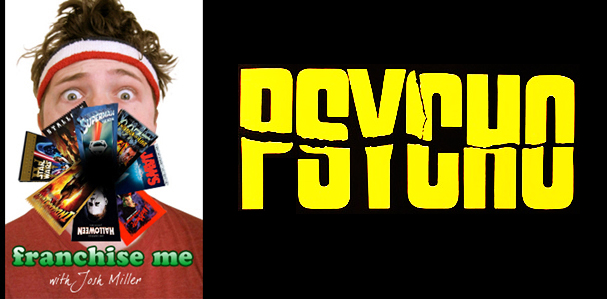
Hollywood loves a good franchise. The movie-going public does too. Horror, action, comedy, sci-fi, western, no genre is safe. And any film, no matter how seemingly stand-alone, conclusive, or inappropriate to sequel, could generate an expansive franchise. They are legion. We are surrounded. But a champion has risen from the rabble to defend us. Me. I have donned my sweats and taken up cinema’s gauntlet. Don’t try this at home. I am a professional.
Let’s be buddies on the Facebookz!
The Franchise: Psycho — following the deadly legacy of the Bates Motel and its primary caretaker, Norman Bates (Anthony Perkins). The series launched with Alfred Hitchcock’s 1960 landmark adaptation of author Robert Bloch’s novel of the same name, and spawned over the next 38 years three sequels, a failed TV series that was converted into a failed TV movie, and the most infamous remake in recent cinema history. We shall be checking in over night on all six Psycho installments.
previous installments
Psycho
Psycho II
Psycho III
Bates Motel
The Installment: Psycho IV: The Beginning (1990)
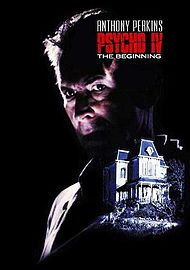
The Story:
Last we left Norman Bates in his proper timeline, he had once again been apprehended for dressing up as his mother and murdering customers and nosy-nosertons at the Bates Motel. Everyone seemed very confident that this was the last straw for Norman. Homicidal maniacs don’t get third chances. Or do they? Answer: yes they totally do. Norman is now out of the hospital once more, and what do you know, he’s in love and living with a woman! Awww. Is Norman keeping his body-filled past a secret from his love? Nope, not only does she know, she works at the hospital where Norman was sent after Psycho III. That’s a bit weird, but it’s not like Norman is in a position to judge. Unfortunately, all is not well in Norman’s happy world, as we learn when Norman calls into “The Fran Ambrose Show,” a talk radio program hosted by Ms. Ambrose (C. C. H. Pounder), that just so happens to be doing a show on matricide featuring Dr. Richmond (now played by Warren Frost) the very same doctor who bored the hell out of us during Psycho‘s epilogue. During the course of the conversation, after Norman admits that he plans to kill again, Ambrose keeps Norman on the phone by getting him to divulge stories about his past, which we see in flashbacks involving Young Norman (E.T.‘s Henry Thomas) and an alive Norma Bates (Olivia Hussey). Eventually we discover that Norman plans to kill his new ladyfriend because she got pregnant and doesn’t want to abort the baby. And Norman does not wish to spread his deranged genes to a new generation.
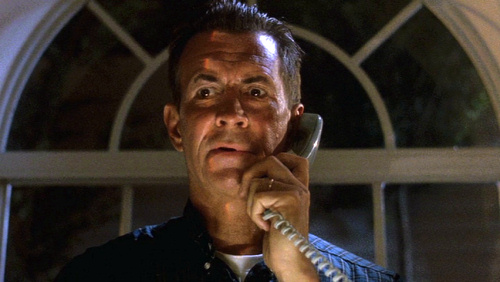
What Works:
Say what you will about III becoming a common slasher film, but II left the door wide open. We would always wonder what happened after Norman killed Emma Spool. Then we found out and Norman got caught again. He was still alive, yes, but he was never going to get released again. And why would he escape? Norman didn’t like killing people. He’s no Michael Myers. That’s what makes the character compelling, but it is also what makes each new sequel far from a no-brainer (conceptually, that is). So jumping back in time for a prequel is a canny move to milk more out of the franchise without having to fuck with things too ridiculously. Much has been made about the events of Norman’s childhood, yet few exact details have been given. We know there were other victims before Marion Crane, but that’s where our info ends. So Psycho IV‘s blast to the past is enjoyable in a pleasant fan-pandering kind of way (only diehard fans will have stuck with the franchise this long anyway; the normals all gave up after II). Even in 1960 the Bates Motel was looking shabby. It is fun to see everything looking spankin’ new, brightly painted and nary a rotting board in sight, back when the motel was a thriving business.
In the present, Norman explains to Fran Ambrose that his impression of his Mother always sounded like a crotchety old crone because he imagined that she continued aging after he killed her. That makes sense, until we do the math on how old she must have been when Norman originally killed her; math that makes the casting of late-thirty-something and attractive Olivia Hussey rather preposterous. But having Olivia Hussey in a movie is always a great idea. And having Olivia Hussey get topless in a movie is one of the best ideas ever in the history of ideas — as anyone who saw her Romeo & Juliet in English class knows. So, consider this a pass Psycho IV. You only get one.
The Norma Bates story thread is solid. Her relationship with young Norman is what matters most in the film, and these scenes work quite well. Henry Thomas lacks the quirkiness to properly convey the sense that he’s unhinged somewhere deep inside, but he does a nice job in the pre-crazy flashbacks where Norma is slowly crippling his mind. Adding an Oedipal element to Norman’s backstory feels right, and the most effective flashbacks involve Norma and Norman’s Spanking the Monkey-esque relationship of uncool sexual tension and mom-induced boners (speaking of Spanking the Monkey: Jeremy Davies, now that’s who Gus Van Sant should’ve called for the remake). This is the kind of prequel addition that is well calculated. It is new information, yet it feels obvious.
The score isn’t exactly noteworthy here, but I do respect the fact that Universal continued to farm the music out to good (if young) composers. Graeme Revell (The Crow, Basketball Diaries) is no Hermann, Goldsmith or Burwell, but he’s hardly just some hack. His version of the famous Psycho theme has devolved to sound exactly like Richard Band’s theme for Re-Animator, but considering that Band shamelessly ripped off Hermann’s piece, I don’t think that can be held against Revell.
I will also give props to the ending of the film, in which Norman burns down the Bates house. The house has always been the second most important character in the franchise, so there was a subconscious lack of closure every time a film ended with it left unfazed. It was this lack of closure that gave way to the stupid Bates Motel idea. The franchise has overstayed its welcome, so destroying the iconic manor – at the hands of Norman, no less – is a fitting way to try and make a final statement.
His acting is atrocious here, but I’m a sucker for John Landis acting cameos. He plays Fran Ambrose’s producer, Mike Calvecchio. That is all.
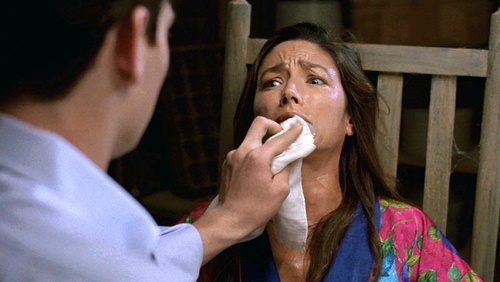
What Doesn’t Work:
Prequels are awkward. On the one hand, as I said, we’ve heard so much about Norman’s backstory that it feels somewhat natural to finally explore it. Yet we also made it this far without actually needing to see any of this stuff. That is paradox of prequels — the present story was in many ways informed by not seeing this stuff, by only giving the audience bits and pieces and forcing us to glean together a mythology based on random exposition. We moved on, so there is always the danger of giving us too much background information and fucking up a good thing (something Hellraiser IV danced with). Psycho IV was smart enough to take a Godfather II approach, having the prequel elements coexist with sequel elements, and thus never quite stepping across the line — although this was presumably done to work Anthony Perkins into the film, not out of artistic concern. The flashbacks may be the best aspect of the film, but that doesn’t change the fact that they are nonetheless unnecessary to the franchise. This is the first proper installment in the Psycho series that feels groundless.
Universal’s selection of Mick Garris as director shows where their head was at with the franchise — they didn’t really care or at least didn’t get it anymore. Your personal feelings on Garris’ abilities aside, in 1990 he was hot off a box office success with Critters 2 (having yet to fall down the Stephen King rabbit-hole that has consumed his career for the past twenty years). He was a semi-hot horror director. He makes perfect sense if we’re treating Psycho IV as some Part 4 in some random horror franchise. But this franchise had up until now been a bit more than that. Richard Franklin was a Hitchcock student. I’m sure Garris likes, even reveres Hitchcock, but he is hardly an acolyte. Anthony Perkins is no great director, but he was aping Hitchcock and Franklin and III ended up feeling like an evolution of II because of this. The franchise needed someone looking to do thrillers, not horror. If a horror auteur like Romero, Craven, Henenlotter, even Raimi, had been handed the reins, someone who would have put their distinctive stamp on the project, that would be a different story. But Garris is just a workman director — a horror fanboy living the ultimate dream. There is nothing wrong with that, but his approach feels disconnected from the tonal evolution of the franchise. He is only as good as the material, and like Young Norman, the material needed healthier love…
Getting original Psycho screenwriter Joseph Stefano back is far more of a clever marketing gimmick than a clever creative move. I honestly don’t mean any offense to Stefano, but other than writing for The Outer Limits, his career between 1960 and 1990 does not exactly make one wonder why it took Universal this long to get him back into the fold. (Getting Robert Bloch involved with Psycho IV would have been the truly savvy move.) Stefano’s script does not feel like a return to Psycho. Nor does it feel like a continued extension of what came before it. The timbre of this Norman Bates is different, adrift as its own thing. And the lack of deserved explanation as to how the fuck Norman got released again so soon after III gives the suspicious feeling that we’re in fact skipping over II and III entirely — that Stefano (who knows, maybe angry about Universal taking so long to invite him back) has sneakily made his own alternate universe Psycho II. The number of victims Norman has claimed is fuzzy. There is no mention of Emma Spool, in the present or the flashbacks. Dr. Richmond has returned. In fact, Psycho IV actually works a lot better if we view it as a direct follow up to Psycho. If it were a better film than II and III, I might be inclined to happily accept it as the true heir. But it isn’t. So too bad Stefano. You left us with a precariously ambiguous installment.
The Anthony Perkins sections of Psycho IV are a little embarrassing. Perkins clearly doesn’t care as much as he used to. If Universal had allowed him to direct again, I bet he would have. But as is, this is obviously just a payday for him now. The film also premiered on Showtime, and the bulk of the meager budget visibly went into the flashbacks. For 80% of his scenes Perkins never leaves his kitchen, simply talking on the phone with the characters in the equally claustrophobic radio booth set. These films have always been small productions with a fixed location, but this is the first film in the franchise to feel small. And the radio call-in gimmick doesn’t feel in place with the franchise. It is too gimmicky. It is an unwanted break from the general format of the series, which has always spanned many days. The real-time urgency and closed-space we get in Norman’s story now gives off the tone of an anthology TV episode. Plus, I just don’t buy that Norman Bates would waste his time calling into Ambrose’s show. He neither relishes his crimes nor enjoys talking about them.
Psycho III may have been the installment that most resembled a cliche slasher flick, but Psycho IV is the first installment where I’d place “quality nudity” as one of its biggest selling points. That says something. The film comes close to achieving what Phantasm IV did — making up for sagging quality with deep-track-style fan-pandering. It was moving in an interesting direction conceptually, but ultimately comes off as completely indifferent. During the climax, when Norman is burning down the house, he is confronted by specters of his victims. His victims in Psycho IV. Obviously it would be tricky/expensive to show us Marion Crane, Arbogast, Spool, or his victims from III. But omitting them gives the distinct feeling that IV is entirely stand-alone, skipping past not only II and III, but in a sense, the original film too.

Body Count: 4
Best Kill: The pivotal and lengthy scene in which Young Norman poisons Norma and her new lover, Chet (Thomas Schuster), is fairly disturbing and tense.
Best Norman Line That Really Should Have Tipped Someone Off: To Fran Ambrose over the phone. “Oh, I’ve killed before, and now I’m gonna have to kill again.” Oh wait, I guess that does tip them off.
Best Mother Line: After locking Norman in the closet, dressed as a girl. “You’re gonna stay locked in there until you learn not to say “no” to your mother when she tells you you’re a girl!”
Stupidest Line: After Young Norman uses the word ‘inordinately’ in a sentence.
Holly: Inordinately. I love sexy words.
Does the Twist Ending Hold Water: No twist.
Should There Be a Sequel: The end of Psycho III was very conclusive. This film ignored that. Now we have another conclusive ending. Yes, Norman is free, so technically we could just ignore logic once more, but we’re already in a law of diminishing returns spiral here. Continuing down this path can only yield bullshit. The only remotely inventive approach would be jumping forward in time to see Norman dealing with Norman Jr going crazy. But I don’t think anyone cares enough to warrant that. Let’s quit while we’re only slightly behind guys.
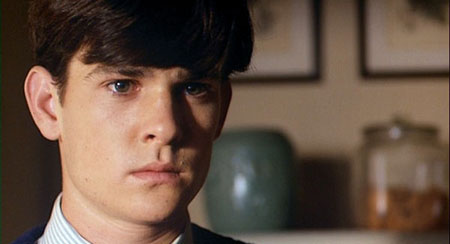
Up Next: Psycho 1998
DISCUSS THE FRANCHISE ON THE BOARDS
previous franchises battled
Critters
Death Wish
Hellraiser
Home Alone
Leprechaun
The Muppets
Phantasm
Planet of the Apes
Police Academy
Rambo
Tremors